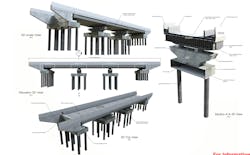Mott MacDonald and SYSTRA saved 10,000 hours on design of Britain’s HS2 Project
High Speed Two (HS2) is Britain’s first new, intercity railway north of London in more than 100 years. The entire £55.7-billion (US$70.83-billion) project will connect eight of the 10 largest cities in Britain and will be delivered in two phases. The first phase will include the line between London and Birmingham, which will be completed by 2026.
As part of this part of this large project, Mott MacDonald and SYSTRA are working together as part of a design joint venture for two main works civil contract lots N1 and N2. The design teams are collaborating with the Balfour Beatty/VINCI (BBV) joint construction venture, who is working on behalf of HS2. Together, Mott MacDonald and SYSTRA are designing the railway route from London to Birmingham as part of the first phase. The £4 billion (US$5.09 billion) Area North project is a 70-meter (229.6-foot) stretch of the 354-kilometer-long (220-mile-long) HS2 project, and is divided into 350 assets, including 53 tunnels and 74 kilometers (46 miles) of cuttings associated with surrounding civil works.
The Mott MacDonald/SYSTRA design joint venture included main engineering centers in the United Kingdom, France, Poland, India and South Korea, with other offices in other parts of the globe. The project team needed to overcome the challenges surrounding collaboration, access to data and delivering consistent and good quality deliverables. With 1,850 users on the ProjectWise system, the project team had to contend with 43,000 incoming files and production of 61,000 design files, not including iterations of those designs. Collaboration was key to delivering this important project.
Improving Collaboration with a Connected Data Environment
For a project of this size and scope, the project team realized that traditional means of collaboration and information management would not work. Instead, the best way for Mott MacDonald and SYSTRA to manage all the data for effective collaboration was to create a digital twin. First, however, the project team needed to organize the data and place it on a single platform. Team members divided the N1 and N2 sectors into eight subplots. These subplots reported information back to the project management, then to BBV, and then ultimately to HS2. This system allowed for easy transfer of information across the entire job and all disciplines.
Mott MacDonald and SYSTRA then developed a connected data environment based on ProjectWise, using a template as the foundation and then enhancing it to meet BBV’s requirements. The team utilized ProjectWise and ProjectWise Deliverables Management to quickly and seamlessly sync the data, creating a single source of truth for users and offices around the world to access. Workflows built in ProjectWise were based on British information management standards, allowing the many disciplines to work with the data and create deliverables while knowing that the information was suitably checked and verified.
“There were a lot of different assets and different disciplines that needed to come together to produce one design,” said Kristof Komeny, information manager at Mott MacDonald. “Data is at the heart of what we do, but it wouldn’t have been possible without a ProjectWise connected data environment. It allows everyone to work with the same information.”
Developing Model-based Delivery for More Efficient Workflows
Using the data housed in ProjectWise, Mott MacDonald and SYSTRA were able to implement model-based delivery to minimize drawing production. The team developed models of the project assets and incorporated all the required information into the model, sharing it with the client and stakeholders in a single location.
“To cover the modeling of the multiple disciplines that we have on the project, our team used several Bentley applications,” explained Leïla Essemrhouni, BIM manager at SYSTRA. “The interoperability between the applications has been successfully and easily achieved.”
These models streamlined decision-making, as everyone could visualize the latest data in a user-friendly way. The team used Navigator as a design review application, which allowed team members to mark-up features and make comments. This capability led to easier collaboration, both internally and with external stakeholders and the client.
Besides these collaborative workflows, other ways that Mott MacDonald and SYSTRA enhanced the involvement of all stakeholders and the client was with improved visualization. Working with the data from ProjectWise, the team used LumenRT and SYNCHRO to create virtual reality environments and interactive fly through videos. Seeing the designs in this format enabled stakeholders and the client to better picture what the final design would look like, which led to more streamlined decision-making as the project progressed.
Creating a Single Source of Truth for All Components
One of the ways that the project team ensured that it met all BBV’s goals was by creating a components catalogue, a commonly agreed project reference that covered all the involved disciplines and their components. For each component, the team defined the graphical representation and design attributes, developing it with all internal stakeholders through discipline-specific workshops. All this information was housed in ProjectWise so that the entire team could access the catalogue when needed. By involving BBV in the process early on and creating a single repository of component information, communication among all stakeholders was enhanced and there was a greater understanding of what would be delivered.
Another way that ProjectWise helped improve the client’s confidence in the project deliverables was a common checking capability. For this practice, the team would run a data check of all the models and produce reports that were stored in ProjectWise. All necessary participants could access these reports and see any discrepancies between the models and the project standards. Since these reports were also developed in close collaboration with the client, everyone knew where the discrepancies were and could work to remedy them. This capability saved 30 minutes per model, which would be about 10,000 total hours. If any risks or hazards were detected, the project team used OpenBuildings Designer to tag the coordinates and house that information in ProjectWise. Creating a single source of truth for all hazards allowed the team to capture 100 percent of design risks and visualize them, leading to even greater client confidence with top-notch safety of the project.
Saving Time By Breaking the Status Quo
When the Mott MacDonald and SYSTRA project leaders realized that traditional project delivery methods were not going to work for this large, complex project, they turned to digital project delivery. ProjectWise allowed the team to develop a single source of truth for all information, which helped the organizations make large-scale design decisions in an effective way. Insights were easier to access, as the information was always up to date, verified, and located on user-friendly dashboards. The client was involved throughout the design phase to meet expectations, leading to greater confidence in the entire design process. Over the course of the design phase of this project, Mott MacDonald and SYSTRA have produced over 4,000 design information models. By removing design drawing production with model-based delivery, the team saved significant design time, allowing team members to focus on enhancing the quality of the design and improving client and stakeholder collaboration and engagement.
Moving into the construction phase, Mott MacDonald and SYSTRA’s design has led to better construction management and helped meet the engineers’ needs. Already, with the information models that were created from ProjectWise data, BBV has been able to reduce the number of joints on the project while automating all repetitive tasks to focus on value-adding activities. The approach developed by Mott MacDonald and SYSTRA has achieved behavioral changes and skills development among both the project team and stakeholders. Moving forward, both organizations plan to share the lessons learned on this project so that their peers may use this approach for the success of their projects.
---------------------------------
Project Summary
Organization
Mott MacDonald/SYSTRA working with Balfour Beatty/VINCI Joint Venture
Solution
Project Delivery
Location
Birmingham, County North Sectors, United Kingdom
Project Objectives
• To develop a single source of truth for all project information, improving collaboration across the global offices.
• To create a digital twin of the project site that the client could use during construction.
Products Used: gINT, iModelHub, MicroStation, Navigator, OpenBridge, OpenBuildings Designer, OpenRail, OpenRoads, ProjectWise, SYNCHRO
Fast Facts
• High Speed Two (HS2) is Britain’s first new, intercity railway north of London in more than 100 years, connecting eight of the 10 largest cities.
• Mott MacDonald and SYSTRA are part of a design joint venture for two main works civil contract lots.
• The project team used ProjectWise to develop a connected data environment, allowing disciplines to always work with verified data.
ROI
• During the design phase, Mott MacDonald and SYSTRA produced more than 4,000 design information models.
• The common checking capability saved 30 minutes per model, which would be about 10,000 total hours.
• Creating a single source of truth for all hazards allowed the team to capture 100 percent of design risks, visualize them and remediate.
About the Author

Victor Alvarez
Victor Alvarez is the director of product marketing, project delivery, at Bentley Systems, focusing on the promotion of Bentley’s project delivery solutions, including ProjectWise. Prior to serving in this role, he was the senior manager of applications marketing at Bentley, responsible for the utilities, communications, electrical, and mining product lines. He is a seasoned product management and product marketing professional with more than 19 years of experience in high-technology environments. Alvarez holds a Master of Science in systems architecture engineering from the University of Southern California and an MBA from the Anderson School of Management at the University of California at Los Angeles (UCLA).

